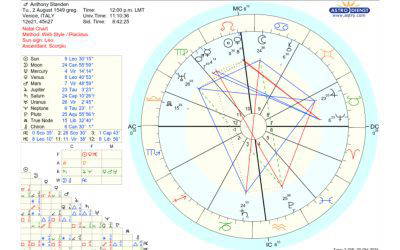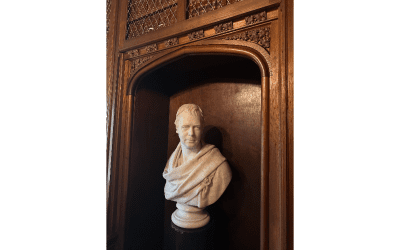Jean-Baptiste Morin and Astrology
I posted recently about using AI to generate horoscopes for use in my fifth novel of the Sir Anthony Standen Adventures, The Favourite Murder. I have been writing a scene today where Anthony is meeting with Jean-Baptiste Morin (1583-1656) to have is horoscope done....
The Pencil
I write the Sir Anthony Standen Adventures on my computer and sometimes my tablet. I make notes in my notebook or on scraps of paper with whatever is at hand, pen or pencil. In The Suggested Assassin Sir Anthony yearns for a kind of magic quill which could be used to...
AI and Writing
I have written about AI before. I have occasionally used it to create an illustration for my blog, often with hilarious results. But I have now found a use for AI in writing. In my work in progress, The Favourite Murder, the fifth book in the Sir Anthony Standen...
Language and Gamut
I become increasingly fascinated by language. I studied English (language and literature), French and German at O Level, before focussing on maths and physics at A level, and Engineering Science at university. Only when I took a degree in Modern Language Studies...
History – The Prequel
Claire told me long ago that time immemorial, or before legal memory, is defined as before 1189 A.D., and was fixed by the Statute of Westminster in 1275. Today we visited Stonehenge, a Neolithic stone circle on Salisbury Plain, and it made me wonder what the...
Cardinal Richelieu and the Duke de Richleau
Do Cardinal Richelieu and the Duke de Richleau have anything in common? I posted recently about the Dartmouth Book Festival. One thing that I forgot to mention is that in John Suchet’s introduction he mentioned that he was a fan of historical fiction and had started...
Ethics and Moriarty
The October edition of Red Herrings has landed on the doormat. Sadly David Stuart Davies has passed away. He was editor of Red Herrings for twenty years and was an internationally known Sherlock Holmes expert. In this edition I discovered that the man labelled the...
Trust the Process
I remember reading that if you want to carve a sculpture of someone, start with a block of marble, and chip away everything that doesn’t look like the person. It might have been an elephant, I can’t remember. It seems to me about as useful as saying that if you want...
Dartmouth Book Festival
I posted recently about the Dartmouth Book Festival, sadly it has now come and gone. What a fabulous event it was. Claire and I were entertained and enlightened in equal measure. It was very professionally organised and run, which is amazing because most of the people...
Jean-Baptiste Morin and Astrology
I posted recently about using AI to generate horoscopes for use in my fifth novel of the Sir Anthony Standen Adventures, The Favourite Murder. I have been writing a scene today where Anthony is meeting with Jean-Baptiste Morin (1583-1656) to have is horoscope done....
The Pencil
I write the Sir Anthony Standen Adventures on my computer and sometimes my tablet. I make notes in my notebook or on scraps of paper with whatever is at hand, pen or pencil. In The Suggested Assassin Sir Anthony yearns for a kind of magic quill which could be used to...
AI and Writing
I have written about AI before. I have occasionally used it to create an illustration for my blog, often with hilarious results. But I have now found a use for AI in writing. In my work in progress, The Favourite Murder, the fifth book in the Sir Anthony Standen...
Language and Gamut
I become increasingly fascinated by language. I studied English (language and literature), French and German at O Level, before focussing on maths and physics at A level, and Engineering Science at university. Only when I took a degree in Modern Language Studies...
History – The Prequel
Claire told me long ago that time immemorial, or before legal memory, is defined as before 1189 A.D., and was fixed by the Statute of Westminster in 1275. Today we visited Stonehenge, a Neolithic stone circle on Salisbury Plain, and it made me wonder what the...
Cardinal Richelieu and the Duke de Richleau
Do Cardinal Richelieu and the Duke de Richleau have anything in common? I posted recently about the Dartmouth Book Festival. One thing that I forgot to mention is that in John Suchet’s introduction he mentioned that he was a fan of historical fiction and had started...
Ethics and Moriarty
The October edition of Red Herrings has landed on the doormat. Sadly David Stuart Davies has passed away. He was editor of Red Herrings for twenty years and was an internationally known Sherlock Holmes expert. In this edition I discovered that the man labelled the...
Trust the Process
I remember reading that if you want to carve a sculpture of someone, start with a block of marble, and chip away everything that doesn’t look like the person. It might have been an elephant, I can’t remember. It seems to me about as useful as saying that if you want...
Dartmouth Book Festival
I posted recently about the Dartmouth Book Festival, sadly it has now come and gone. What a fabulous event it was. Claire and I were entertained and enlightened in equal measure. It was very professionally organised and run, which is amazing because most of the people...









